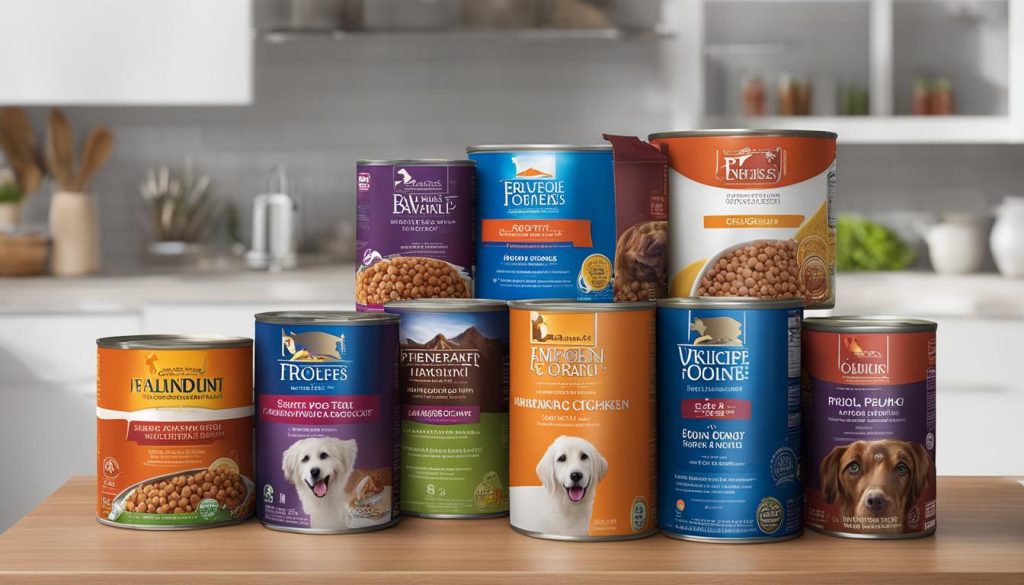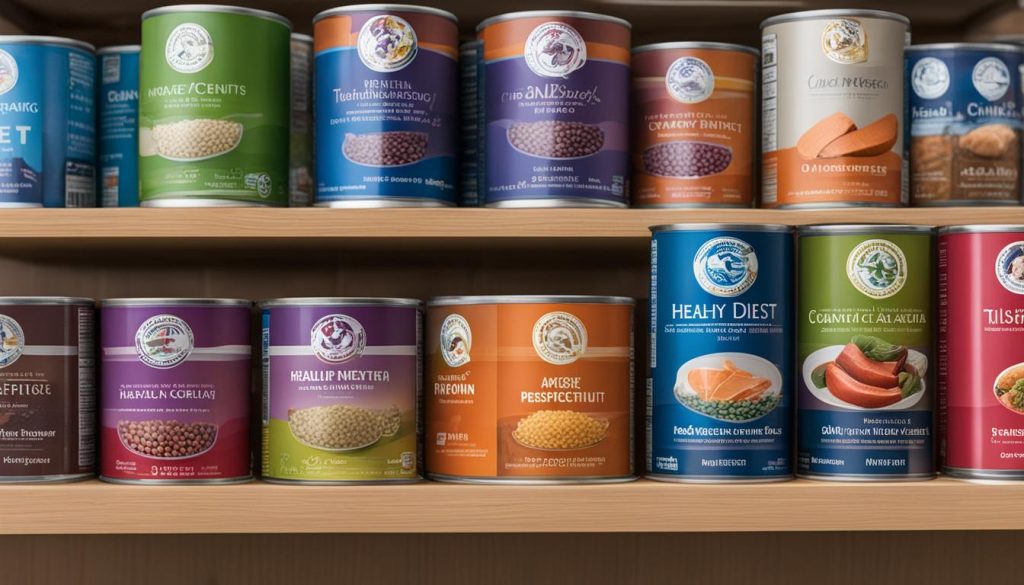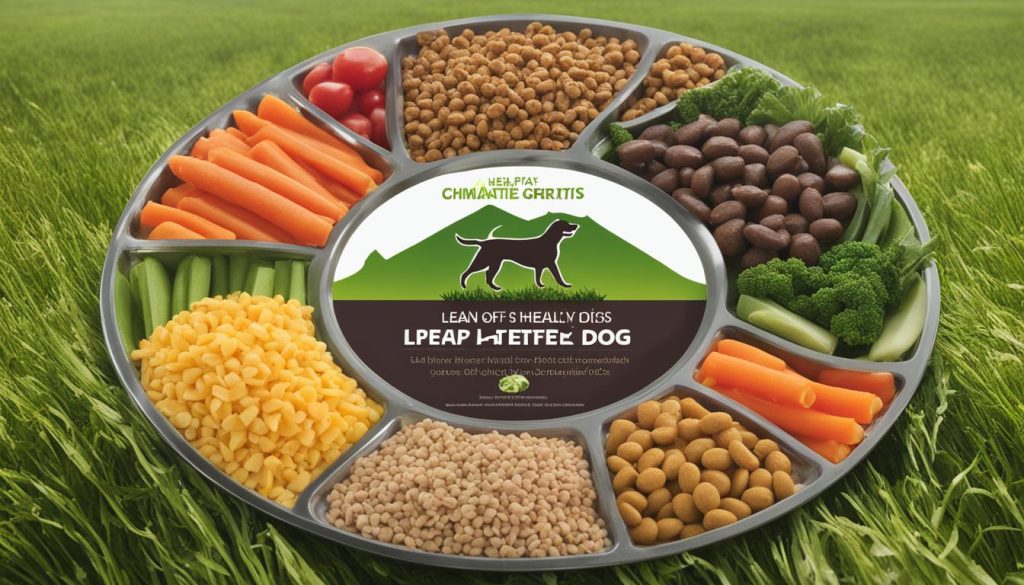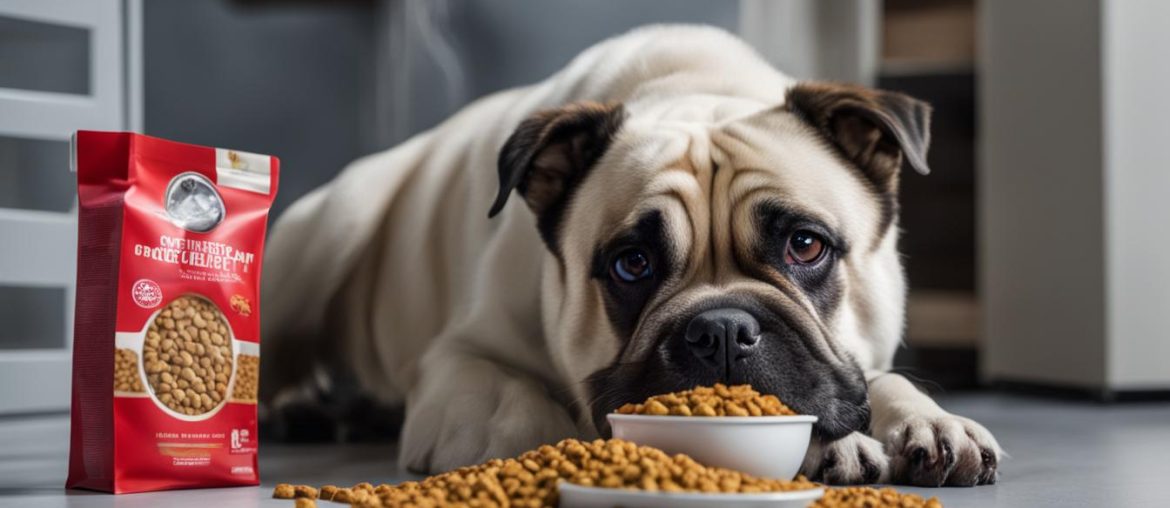Understanding the role of proper nutrition in managing pancreatitis is crucial for the well-being of dogs. Pancreatitis is a serious condition that affects the pancreas and requires careful dietary management to support recovery and overall health. A low-fat, high-digestibility diet is generally recommended for dogs with pancreatitis to minimize stress on the pancreas.
When selecting the right foods, options include commercially available pancreatitis-friendly dog food from reputable brands like Royal Canin, Hill’s Science Diet, Purina, Iams, and Eukanuba. These brands offer diets specifically formulated to meet the nutritional needs of dogs with pancreatitis. Homemade diets can also be considered, but it’s important to consult with a veterinary nutritionist to ensure the diet is balanced and meets the dog’s needs.
Owners should always follow their veterinarian’s guidelines for feeding dogs with pancreatitis. It’s important to consider the cost of prescription diets and homemade diets, as well as potential adverse reactions with certain foods. With proper nutrition and veterinary guidance, dogs with pancreatitis can be well-managed and have improved quality of life.
Key Takeaways:
- A low-fat, high-digestibility diet is generally recommended for dogs with pancreatitis.
- Commercially available pancreatitis-friendly dog food brands like Royal Canin, Hill’s Science Diet, Purina, Iams, and Eukanuba offer suitable options.
- Homemade diets can be an option, but it’s important to consult with a veterinary nutritionist to ensure balance and nutritional adequacy.
- Owners should always follow their veterinarian’s guidelines for feeding dogs with pancreatitis.
- Cost and potential adverse reactions should be considered when choosing a diet for dogs with pancreatitis.
Understanding Pancreatitis in Dogs
Pancreatitis is a common and serious inflammatory condition that affects the pancreas in dogs. It can be classified as acute or chronic, with acute cases being sudden and severe, and chronic cases being long-standing. The exact cause of pancreatitis is often unknown, but there are several potential risk factors and triggers. Some common causes of pancreatitis in dogs include obesity, high-fat diets, certain medications, hormonal disorders, and underlying gastrointestinal diseases.
Dogs with pancreatitis display a range of symptoms, which can vary in severity. The most common symptoms include vomiting, diarrhea, loss of appetite, abdominal pain, lethargy, and dehydration. These symptoms can be similar to other digestive disorders, making an accurate diagnosis crucial. Diagnostic tests such as bloodwork, abdominal ultrasound, and specific pancreatic enzyme tests, can help confirm the presence of pancreatitis and determine the severity.
Early detection and prompt treatment of pancreatitis are essential for successful management. Treatment typically involves supportive care, such as intravenous fluids to maintain hydration, pain management, and medication to control vomiting. In severe cases, hospitalization may be necessary. It’s important to work closely with a veterinarian to develop a treatment plan tailored to your dog’s specific needs and to monitor their progress closely.
| Acute Pancreatitis | Chronic Pancreatitis |
|---|---|
| • Sudden and severe onset | • Long-standing condition |
| • Can result in more severe symptoms | • Symptoms may be less severe or intermittent |
| • Often requires immediate medical attention | • Requires ongoing monitoring and management |
The Importance of Nutrition for Dogs with Pancreatitis
Nutrition plays a vital role in the management and recovery of dogs with pancreatitis. Proper nutrition helps support the healing process, reduce inflammation, and prevent further episodes of pancreatitis. When it comes to feeding dogs with pancreatitis, it is important to consider their specific nutritional requirements based on factors such as their body condition, life stage, and overall health status. A well-balanced diet that is low in fat and high in digestibility is particularly important for dogs with pancreatitis.
Body condition scoring is a useful tool to determine the appropriate calorie intake and nutritional needs of a dog. This assessment helps determine if a dog is overweight, underweight, or at an ideal body condition. Different life stages have varying dietary requirements, and specific considerations should be given to older dogs. For example, a lower-calorie diet with increased fiber may be recommended for weight management and to support their aging digestive system.
For dogs with pancreatitis, a low-fat, high-digestibility diet is essential. Commercially available pancreatitis-friendly dog foods from reputable brands often meet these criteria. These diets are specially formulated to minimize stress on the pancreas while providing the necessary nutrients for overall health. Homemade diets can also be an option, but it is crucial to consult with a veterinary nutritionist to ensure the diet is properly balanced and meets the dog’s specific nutritional needs.
Table: Nutritional Guidelines for Dogs with Pancreatitis
| Nutritional Requirement | Guidelines |
|---|---|
| Low Fat | Aim for a diet that is less than 10% fat on a dry matter basis to minimize stress on the pancreas. |
| High Digestibility | Select foods that are highly digestible to ease the workload on the pancreas and promote nutrient absorption. |
| Proper Balance of Nutrients | Ensure the diet includes adequate protein, carbohydrates, vitamins, and minerals to meet the dog’s nutritional needs. |
| Body Condition Management | Monitor the dog’s body condition and adjust the diet to promote weight management. |
| Consult with a Veterinary Nutritionist | Seek guidance from a veterinary nutritionist to create a tailored diet plan that suits the dog’s specific needs. |
By paying close attention to the role nutrition plays in managing pancreatitis, pet owners can help support their dog’s recovery and overall well-being. It is important to follow the guidance of a veterinarian and make any necessary dietary adjustments based on the dog’s response and condition. With the right nutrition, dogs with pancreatitis can lead healthier lives and reduce the risk of future pancreatitis flare-ups.
Commercial Pancreatitis-Friendly Dog Foods

When it comes to feeding dogs with pancreatitis, there are several commercial dog food options available that are specifically formulated to be pancreatitis-friendly. These diets focus on being low in fat and high in digestibility, which are essential for supporting the healing process and reducing stress on the pancreas. The following table provides a comparison of reputable dog food brands that offer pancreatitis-friendly options:
| Brand | Low-Fat Options | Fat Content (Dry Matter Basis) |
|---|---|---|
| Royal Canin | Yes | 8% or less |
| Hill’s Science Diet | Yes | 8% or less |
| Purina | Yes | 8% or less |
| Iams | No | N/A |
| Eukanuba | No | N/A |
These reputable dog food brands offer a range of options for dogs with pancreatitis, with fat content typically ranging from 8% or less for low-fat options. It’s important to read the guaranteed analysis on the dog food label to determine the fat content on a dry matter basis, as this provides a more accurate representation of the fat content in the diet. These commercial diets are convenient and designed to meet the specific nutritional needs of dogs with pancreatitis, providing owners with a reliable option for managing their dog’s condition.
Homemade Diets for Dogs with Pancreatitis
When it comes to feeding dogs with pancreatitis, homemade diets can be a viable option. However, it is crucial to consult with a veterinary nutritionist to ensure that the homemade diet is safe, balanced, and meets the specific nutritional needs of the dog. Consulting with a professional will help determine the appropriate ingredients and proportions to use in a homemade pancreatitis diet, considering factors such as low-fat content and high digestibility. With their expertise, a veterinary nutritionist can guide dog owners in creating homemade recipes that are both nutritious and suitable for dogs with pancreatitis.
When formulating a homemade pancreatitis diet, it is essential to focus on using low-fat ingredients that are easily digestible. Boiled chicken, low-fat beef, egg whites, yogurt, barley, cooked vegetables, and rice are some examples of ingredients that can be incorporated into a homemade pancreatitis diet. These ingredients provide essential nutrients while reducing the workload on the pancreas. It is important to avoid excessive fat and include adequate protein, fiber, vitamins, and minerals to maintain a balanced diet.
While homemade diets offer flexibility and control over the ingredients, it is important to note that they require careful attention to safety and balance. Improperly formulated homemade diets can lead to nutritional imbalances and potential health risks. Additionally, homemade diets may require more time and effort in preparation compared to commercial options. It is also essential to consider the cost of ingredients and any potential dietary supplements that may be needed. Therefore, it is crucial to weigh the pros and cons and consult with a veterinary nutritionist to ensure the homemade diet is appropriate for the dog’s needs.
| Pros of Homemade Diets for Dogs with Pancreatitis | Cons of Homemade Diets for Dogs with Pancreatitis |
|---|---|
|
|
Overall, homemade diets can be a suitable option for dogs with pancreatitis, but it is crucial to consult with a veterinary nutritionist to ensure safety, balance, and nutritional adequacy. By working closely with a professional, dog owners can create homemade recipes that support the dog’s recovery and overall well-being, while minimizing the risk of nutritional deficiencies or imbalances. The guidance of a veterinary nutritionist is invaluable in formulating a homemade pancreatitis diet that meets the dog’s specific needs.
Prescription Diets for Dogs with Pancreatitis

Prescription diets specifically formulated for dogs with pancreatitis are available from brands like Hill’s Prescription Diet and Royal Canin. These diets are designed to meet the unique nutritional needs of dogs with pancreatitis, including low fat content (below 18% or even 8% in some cases). Prescription diets can be beneficial in managing pancreatitis and providing a balanced diet. However, they are often more expensive compared to regular commercial diets. Owners should consider the cost and availability of prescription diets, as well as any potential adverse reactions, when making a decision. Consulting with a veterinarian can help determine the most suitable prescription diet for a dog with pancreatitis.
Advantages of prescription diets for dogs with pancreatitis include:
- Formulated for pancreatitis: Prescription diets are specifically designed to support dogs with pancreatitis, providing the right balance of nutrients and a low-fat content to minimize stress on the pancreas.
- Quality control: Prescription diets from reputable brands undergo rigorous quality control measures, ensuring that the ingredients are safe and meet the nutritional needs of dogs with specific health conditions like pancreatitis.
- Veterinary guidance: Prescription diets are typically recommended by a veterinarian who can assess the dog’s condition and provide personalized dietary recommendations. This ensures that the dog receives the most appropriate diet for their specific needs.
Disadvantages of prescription diets for dogs with pancreatitis include:
- Cost: Prescription diets are often more expensive compared to regular commercial diets. Owners should consider their budget and the long-term cost of feeding a dog with pancreatitis using prescription diets.
- Availability: Prescription diets may not be readily available in all locations or through all retailers. Owners may have to order them directly from the manufacturer or a veterinary clinic.
- Potential adverse reactions: While prescription diets are formulated to be safe and effective, some dogs may have adverse reactions or allergies to certain ingredients. It is important to monitor the dog closely for any signs of adverse reactions and consult with a veterinarian if necessary.
| Brand | Recommended Prescription Diet | Fat Content |
|---|---|---|
| Hill’s Prescription Diet | Hill’s Prescription Diet i/d Digestive Care Low Fat | 8% |
| Royal Canin | Royal Canin Veterinary Diet Gastrointestinal Low Fat | 7% |
Dietary Guidelines for Dogs Recovering from Pancreatitis

When it comes to managing pancreatitis in dogs, dietary changes play a crucial role in supporting their recovery. After an episode of pancreatitis, it’s important to follow specific guidelines to ensure the dog’s digestive system is supported and future flare-ups are minimized.
One key recommendation is to feed dogs with pancreatitis small frequent meals throughout the day. This approach helps prevent overloading the pancreas and aids in digestion. Instead of two or three large meals, dividing the daily food intake into smaller portions can be more beneficial. Gradually increasing the meal size and frequency as the dog’s condition improves is typically advised.
In some cases, dogs may have difficulty eating due to pain or loss of appetite. In such situations, appetite stimulants can be prescribed by veterinarians to encourage eating. Additionally, feeding tubes may be necessary for dogs that are unable to eat on their own. These tubes deliver food directly to the stomach or intestines, ensuring proper nutrition and hydration during the recovery period.
As the dog progresses in their recovery, a gradual reintroduction of a normal diet may be recommended. This should be done under the guidance of a veterinarian and monitored closely for any adverse reactions. The goal is to transition the dog back to their regular diet while still considering their specific needs and ensuring the pancreas is not overwhelmed.
Table: Dietary Guidelines for Dogs with Pancreatitis
| Dietary Guideline | Description |
|---|---|
| Feed small frequent meals | Divide daily food intake into smaller portions to aid digestion and prevent overloading the pancreas. |
| Consider appetite stimulants | If the dog has difficulty eating, appetite stimulants can be prescribed to encourage food intake. |
| Use feeding tubes, if necessary | For dogs unable to eat on their own, feeding tubes can deliver nutrition directly to the stomach or intestines. |
| Gradually reintroduce normal diet | Under veterinary guidance, slowly transition the dog back to their regular diet while monitoring for any adverse reactions. |
“Proper diet plays a vital role in the recovery of dogs with pancreatitis. By following these dietary guidelines, owners can provide the necessary support to help their dogs heal and minimize the risk of future flare-ups.”
Managing pancreatitis in dogs requires a comprehensive approach that includes proper nutrition. By following the recommended dietary guidelines, pet owners can contribute to their dog’s overall health and well-being while reducing the impact of pancreatitis on their furry companion’s life.
Prevention and Long-Term Management of Pancreatitis
Preventing pancreatitis in dogs is crucial for their long-term health and well-being. One of the key factors in prevention is maintaining a balanced diet that avoids high-fat foods. Feeding dogs with pancreatitis a diet that is low in fat and high in digestibility can help minimize the risk of pancreatitis flare-ups. It’s important to carefully read the labels of commercial dog foods and choose options that are specifically formulated for pancreatitis or have a low-fat content.
In addition to diet, monitoring for symptoms of pancreatitis is essential. Keep an eye out for signs such as vomiting, diarrhea, loss of appetite, abdominal pain, and lethargy. If any of these symptoms occur, it’s important to consult with a veterinarian for proper diagnosis and treatment.
Long-term dietary management is also critical for dogs with pancreatitis. This involves consistently providing a low-fat, high-digestibility diet and regularly monitoring the dog’s weight and overall health. Regular check-ups with a veterinarian can help assess the dog’s condition and make any necessary adjustments to the diet. By following these preventive measures and committing to long-term dietary management, dog owners can help minimize the risk of pancreatitis and promote their pet’s overall health and well-being.
| Preventive Measures for Pancreatitis in Dogs | Long-Term Dietary Management |
|---|---|
|
|
Supplemental Support for Dogs with Pancreatitis
Proper nutrition is essential for dogs with pancreatitis, but there are also supplemental measures that can provide additional support. These supplements can help improve digestion, reduce inflammation, and support overall pancreatic health.
Pancreatic Enzyme Supplements: Pancreatic enzyme supplements can be beneficial for dogs with pancreatitis. These supplements contain digestive enzymes that help break down fats, proteins, and carbohydrates, easing the workload on the pancreas. Consult with a veterinarian to determine the appropriate dosage and select a high-quality supplement.
Fish Body Oils: Fish body oils, such as salmon oil or EPA oil, can provide omega-3 fatty acids that have anti-inflammatory properties. These oils can help reduce inflammation in the pancreas and lower blood lipid levels in dogs with pancreatitis. Follow the recommended dosage provided by the manufacturer or consult with a veterinarian for guidance.
Probiotics and Prebiotics: Probiotics are beneficial bacteria that promote a healthy digestive system, while prebiotics provide nourishment for these beneficial bacteria. Both probiotics and prebiotics can help improve digestion, support immune function, and maintain a healthy balance of gut bacteria. Look for supplements specifically formulated for dogs and consult with a veterinarian for recommendations.
| Supplement | Benefits | Dosage | Notes |
|---|---|---|---|
| Pancreatic Enzyme Supplements | Aids digestion, reduces workload on the pancreas | Follow veterinarian’s recommendations | Select a high-quality supplement |
| Fish Body Oils | Reduces inflammation, lowers blood lipid levels | Follow manufacturer’s dosage or consult with a veterinarian | Choose a reputable source |
| Probiotics and Prebiotics | Promotes a healthy digestive system, supports immune function | Follow manufacturer’s dosage or consult with a veterinarian | Look for products specifically formulated for dogs |
Supplements can play a supportive role in the management of pancreatitis in dogs. However, it’s important to remember that supplements should not replace a balanced diet and medical treatment. Always consult with a veterinarian before adding any supplements to your dog’s regimen, as they can provide guidance based on your dog’s specific needs and condition.
Transitioning to a New Diet for Pancreatitis

When it comes to transitioning a dog with pancreatitis to a new diet, it’s essential to do so gradually to minimize digestive issues. This gradual transition allows the dog’s digestive system to adjust to the new foods without causing any discomfort. Start by mixing small amounts of the new food with the current food, gradually increasing the proportion of the new food over several days or weeks, depending on the dog’s tolerance.
During the transition period, it’s crucial to monitor the dog’s stools and overall well-being. Keep an eye out for any signs of digestive issues, such as diarrhea or vomiting. If any adverse reactions occur, it may be necessary to slow down the transition or consult with a veterinarian for guidance on adjusting the diet.
Introducing new foods to a dog with pancreatitis should be done with caution, as certain ingredients may trigger flare-ups or worsen symptoms. It’s best to stick to low-fat, easily digestible options. Consulting with a veterinarian or a veterinary nutritionist can provide valuable guidance on suitable foods and ensure the transition process is as smooth as possible.
Sample Transition Schedule
| Day | Current Diet | New Diet |
|---|---|---|
| Day 1 | 100% Current Diet | 0% New Diet |
| Day 2 | 75% Current Diet | 25% New Diet |
| Day 3 | 50% Current Diet | 50% New Diet |
| Day 4 | 25% Current Diet | 75% New Diet |
| Day 5 | 0% Current Diet | 100% New Diet |
A gradual transition schedule like the one shown above provides a guideline for introducing a new diet to a dog with pancreatitis. However, each dog may have different tolerances and reactions. It’s crucial to monitor the dog closely throughout the transition process and make adjustments as necessary.
Wrapping Up
To summarize, feeding dogs with pancreatitis requires a thoughtful approach to their dietary needs. The key is to provide a low-fat, high-digestibility diet that supports their recovery and overall health. Whether you choose to use commercially available pancreatitis-friendly dog foods or opt for a carefully formulated homemade diet, it is crucial to seek guidance from a veterinary nutritionist to ensure the diet meets your dog’s specific nutritional requirements.
Remember, the guidance of a veterinarian is essential in selecting the appropriate diet and making any necessary adjustments based on your dog’s condition and response to the diet. They can provide personalized recommendations and help you navigate the challenges of managing pancreatitis in your dog.
Commitment to long-term dietary management is key. Pancreatitis is a condition that requires ongoing monitoring and preventive measures to minimize the risk of flare-ups. By following the recommended dietary guidelines, monitoring for symptoms, and providing a balanced diet, you can help improve your dog’s overall well-being and quality of life.
Ultimately, the health and well-being of your dog are in your hands. By prioritizing their nutritional needs and working closely with your veterinarian, you can ensure that your dog with pancreatitis receives the best possible care and support for their digestive health.
FAQ
What should I feed my dog with pancreatitis?
Dogs with pancreatitis benefit from a low-fat, high-digestibility diet. This can include commercially available pancreatitis-friendly dog foods or carefully formulated homemade diets. Consulting with a veterinary nutritionist is recommended to ensure the diet meets your dog’s nutritional needs.
Which commercial dog food brands offer pancreatitis-friendly options?
Reputable brands like Royal Canin, Hill’s Science Diet, Purina, Iams, and Eukanuba offer pancreatitis-friendly dog foods. These diets are specifically formulated to be low in fat and high in digestibility to support dogs with pancreatitis.
Can I feed my dog a homemade diet for pancreatitis?
Homemade diets can be an option for dogs with pancreatitis. However, it’s crucial to consult with a veterinary nutritionist to ensure the diet is balanced and meets your dog’s nutritional needs. Homemade diets often focus on low-fat ingredients like boiled chicken, low-fat beef, egg whites, yogurt, barley, cooked vegetables, and rice.
Are there prescription diets available for dogs with pancreatitis?
Yes, brands like Hill’s Prescription Diet and Royal Canin offer prescription diets specifically formulated for dogs with pancreatitis. These diets have a low-fat content and are designed to meet the unique nutritional needs of dogs with pancreatitis. However, they are often more expensive than regular commercial diets.
How should I transition my dog with pancreatitis to a new diet?
It’s essential to transition your dog to a new diet gradually to minimize digestive issues. Start by mixing small amounts of the new food with the current food and gradually increase the proportion of the new food over several days or weeks. Monitor your dog’s stools and overall well-being during the transition period and consult with a veterinarian if any issues arise.
What are the long-term management strategies for pancreatitis in dogs?
Long-term management of pancreatitis in dogs involves providing a low-fat, high-digestibility diet, avoiding high-fat foods, maintaining a balanced diet, monitoring for symptoms of pancreatitis, and regular veterinary check-ups. It’s crucial to follow veterinary guidance and make necessary dietary adjustments based on your dog’s condition and response to the diet.






